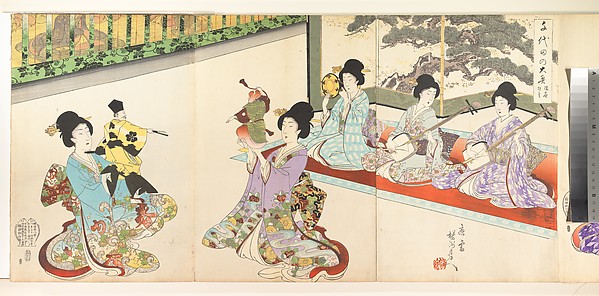 |
| Hashimoto Chikanobu, Ladies in Waiting of the Chiyoda Castle: Sword Practice and Puppet Kyogen, 1895, Met Museum
By Junichiro Tanizaki, trans., Edward G. Seidensticker, New York: Vintage Books, 1995, p. 530
During the inter-war years in Osaka, Japan four aristocratic sisters struggle to maintain a way of life that is quickly fading away. Tsuruko, the oldest sister, clings to the prestige of her family name even as her husband moves their household to Tokyo, where their family is unknown. Sachiko, in contrast to Tsuruko, is a sympathetic young matron and head of the Ashiya family branch. Yukiko is shy, old-fashioned, and, most importantly, unmarried. Taeko is the youngest daughter and an artistic rebel.
The novel has an elegiac tone. Change hangs in the air throughout the story and the impermanence of life is highlighted. The Makioka Sisters portrays a way of life ended by World War II and the Allied Occupation. The Makiokas were once one of the wealthiest families in suburban Ashiya, located in the region between Osaka and Kobe, but over the last generation the status of the family has fallen. Finding a suitor for Yukiko is the chief conflict in the story, and the quality Yukiko's proposed husbands function as an index of the family's declining fortunes.
|
A diary devoted to reading the 100 novels cited in Jane Smiley's 13 Ways of Looking at the Novel
Wednesday, January 16, 2013
The Makioka Sisters
Subscribe to:
Post Comments (Atom)
No comments:
Post a Comment